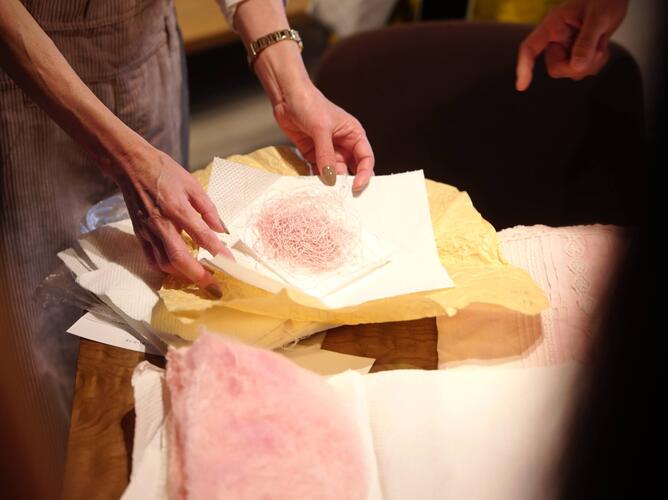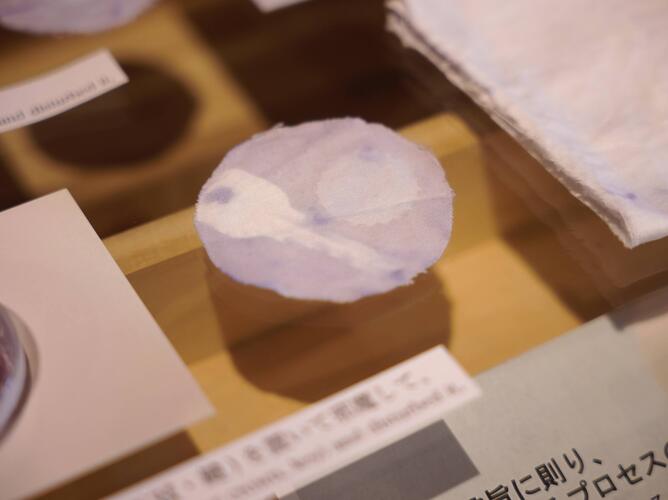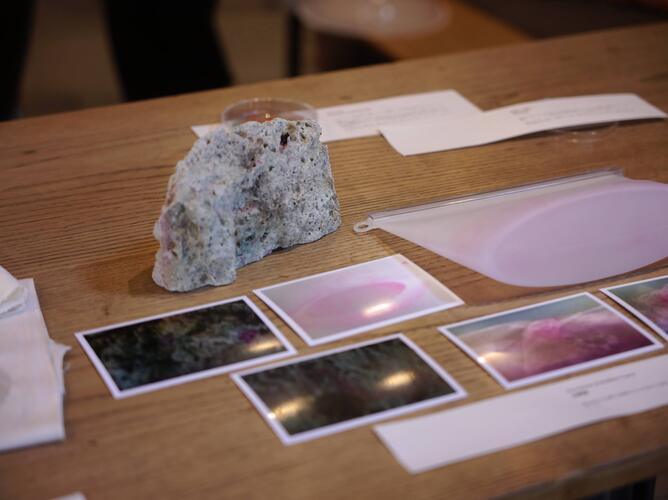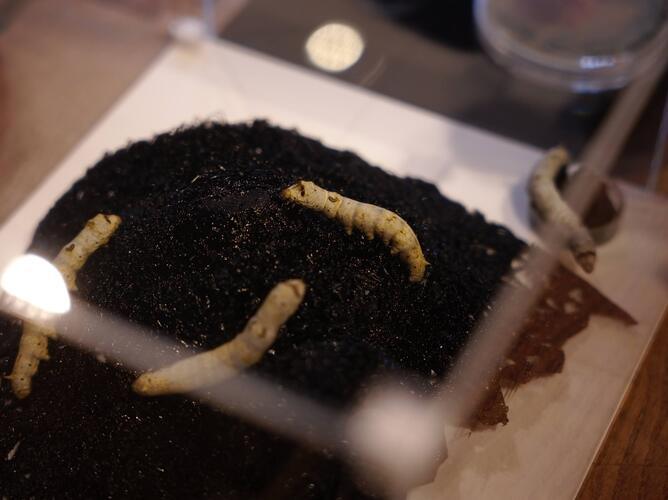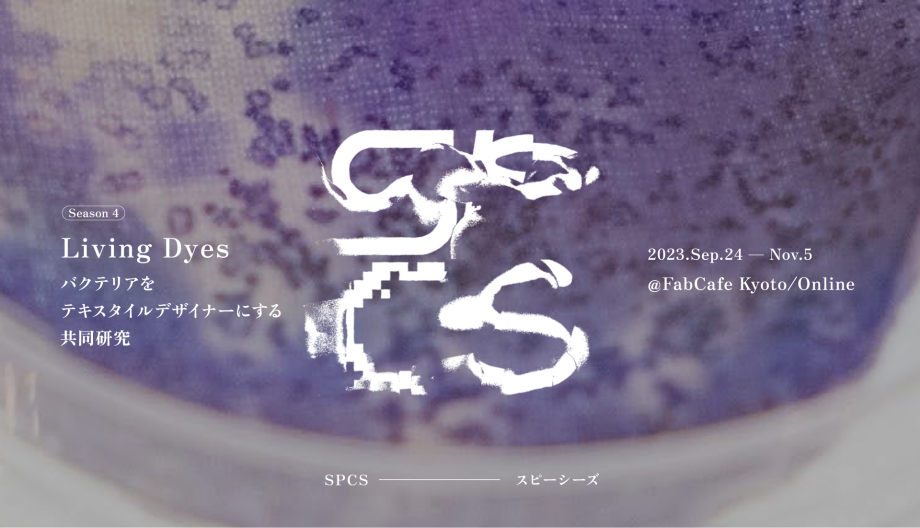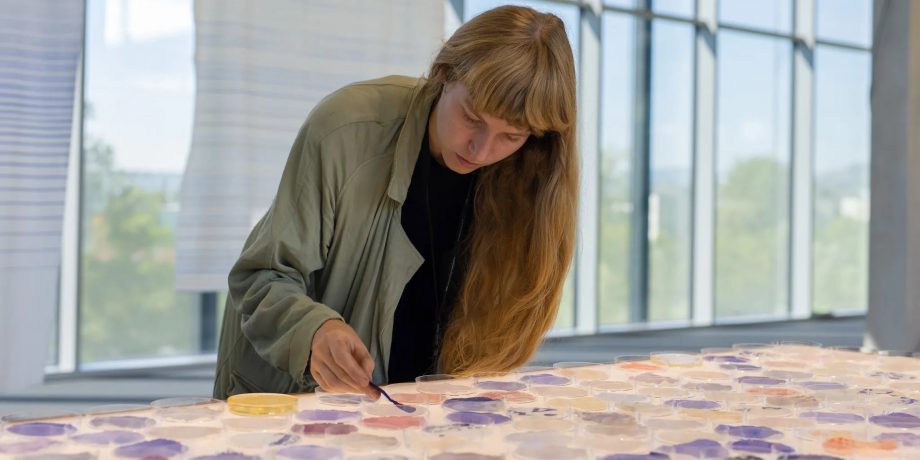Exhibition
- #Finished
- #Entrance Free
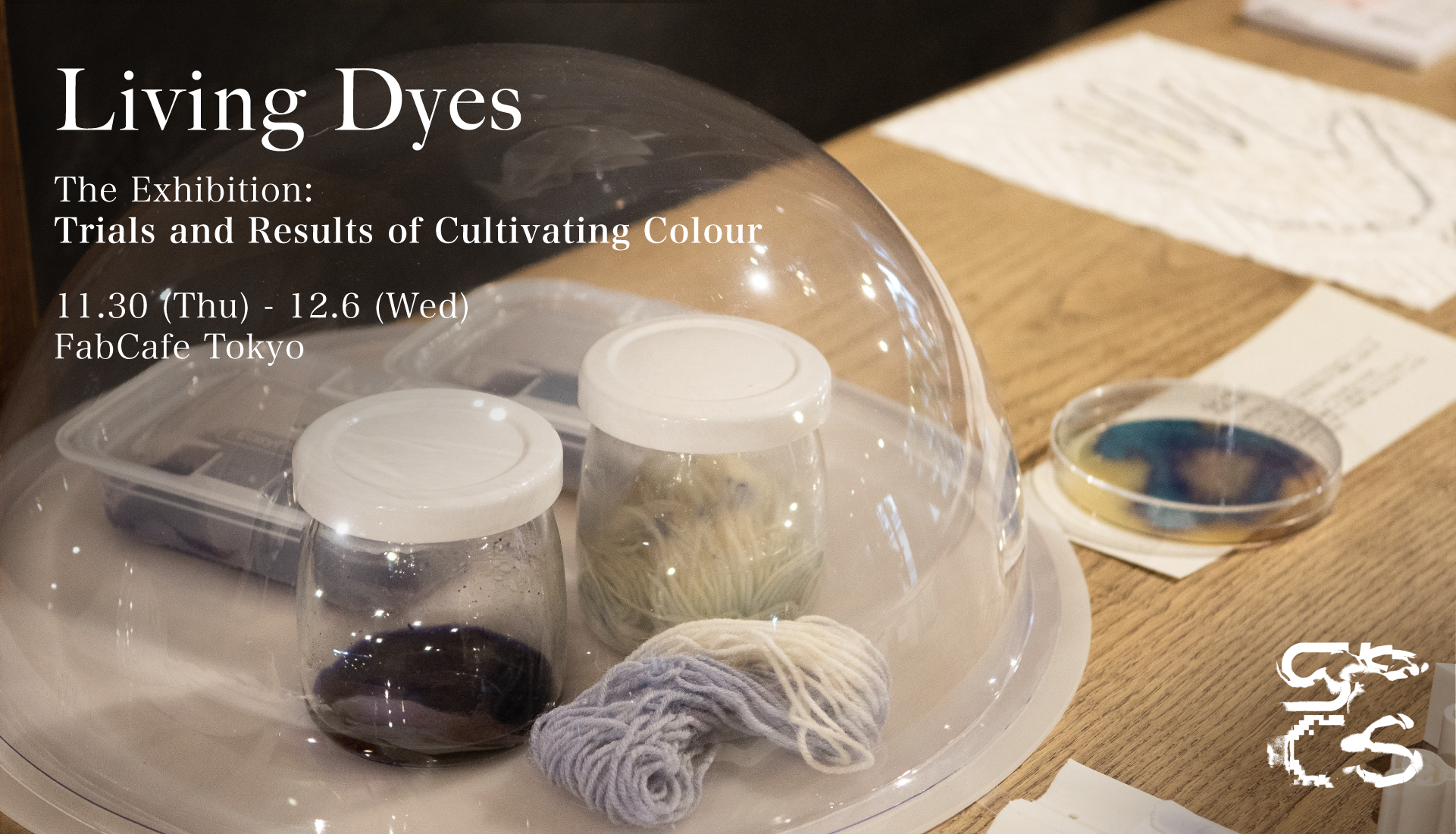
Living Dyes | The Exhibition showcases the process and results of the research and actual dyed works from a 1.5 month workshop on dyeing textiles with bacteria. How do everyday participants adopt this relatively new and undeveloped dyeing technique? Come witness it for yourself. Detailed explanations in a guided tour by the exhibition organiser are also available.
Thu, November 30, 2023 – Wed, December 6, 2023 UTC+09:00
(The Exhibition is open at the same time as FabCafe Tokyo)
FabCafe Tokyo | View on Google Map
Free
Viewing the exhibition does not require registration. Pre-registration above is available for guided tour by the organizer.
Dyeing textiles with bacteria is rare, if not unheard of in Japan, but through a 6 week workshop with BioClub Tokyo founder Georg Tremmel, 23 participants learned DIY bio-techniques and started cultivating pigment-producing bacteria to experiment with. With participants ranging from kimono designers to kombucha makers, and only a handful with a biology background, they faced multiple challenges in multiplying the bacteria. Yet despite those challenges, each participant combined their unique skills and knowledge to create different works with this new source of colour.
This exhibition is the culmination of their trials and struggles with this frontier technology – an experiment in combining traditional techniques with novel mediums, a celebration of the unpredictability of non-human organisms working hand-in-hand with human creativity.
We invite you to witness for yourself the colours and designs cultivated by bacteria.
A guided tour by the workshop organiser is available for those who wish to get a detailed explanation of each work and the process. Please sign up through the link on this event page.
For more information, please contact
SPCS Secretariat
spcs@loftwork.com
https://www.instagram.com/spcs_fabcafekyoto/
-

Silk fibres dyed pink with bacteria and spun into thread by Sachiko Sakairi
-

Kaoru Mizuta plays with the bacteria, disturbing it through pressure, tying and stamping
-

Instead of textiles, Toru Aoyagi dyes the local Oya Stone from where he is based in Tochigi
-

Hiroki Kaimoto experiments with silkworms in an attempt to change the colour of their silk through changing their feed
-
The fashion industry is one of the most pollutive industries in the world. But cutting-edge research in labs and fashion houses including Puma and LVMH have shown that living bacteria might be a cleaner solution to the dyeing process. Join us as we experiment with injecting microorganisms into manufacturing.
-
In the second volume of SPCS Talks, SPCS interviews Julia Moser, textile and fashion designer and YouFab2021 finalist for her project Growing Patterns, Living Pigments. Her work was also exhibited in FabCafe Kyoto and FabCafe Tokyo from March to April.
In this interview, we explore Julia’s motivations behind bacterial dyeing and discuss the implications and possibilities that her bacteria dyes open up for the fashion and manufacturing industry.
-
Georg Tremmel
Artist at BCL, Founder & Director at BioClub Tokyo
Georg Tremmel is an Austrian artist, living and working in Tokyo. He studied Biology, Informatics and Media Art in Vienna and London. Since 2001 he has been working on biological, cultural, ethical and societal codes, creating objects, installations and situations for contestable discussions through the Artistic Research Framework BCL. Georg is currently a PhD Student and Project Researcher at the University of Applied Arts in Vienna, working on ‘Ludic Cultures, Biological Interfaces and Non-Human Agencies. He is also a Visiting Researcher at the metaPhorest Art & Science group at Hideo Iwasaki’s Lab at Waseda University and a Guest Lecturer at the Tokyo University of Fine Arts. Georg is a co-founder and director of the BioClub Tokyo, Japan’s first Open Biolab & Biohackerspace.
Georg Tremmel is an Austrian artist, living and working in Tokyo. He studied Biology, Informatics and Media Art in Vienna and London. Since 2001 he has been working on biological, cultural, ethical and societal codes, creating objects, installations and situations for contestable discussions through the Artistic Research Framework BCL. Georg is currently a PhD Student and Project Researcher at the University of Applied Arts in Vienna, working on ‘Ludic Cultures, Biological Interfaces and Non-Human Agencies. He is also a Visiting Researcher at the metaPhorest Art & Science group at Hideo Iwasaki’s Lab at Waseda University and a Guest Lecturer at the Tokyo University of Fine Arts. Georg is a co-founder and director of the BioClub Tokyo, Japan’s first Open Biolab & Biohackerspace.
-
Julia Moser
Textile & Fashion designer / Founder of Growing Patterns Living Pigments
Julia Moser sees her mission in re-thinking fashion and textile design practices and production processes towards a more sustainable and healthier future. Following the fact that nature knows how to produce colours without chemicals and harmful ingredients, she founded “Growing Patterns Living Pigments” and started to co-create with pigment producing bacteria – dyeing textiles and involving them in the design process as well. With a focus on material innovation and bio design, she uses new technologies to find alternative ways of thinking design and design processes. Always remembering the indigenous tribe of the Kogi saying “You’re meant to work with technology, but if you do so, use technology that works with and not against nature”.
Moser holds two Master degrees in textile.art.design and Fashion&Technology from the University of Art and Design Linz where she currently works as a University Assistant at the Crafting Futures Lab. There she works on her PhD and guides students to find their core values for their design practice, creating a connection to materials and building a bridge between art and science, traditional and new technologies and regaining a connection to nature to create a future for the generations coming after us.
Julia Moser sees her mission in re-thinking fashion and textile design practices and production processes towards a more sustainable and healthier future. Following the fact that nature knows how to produce colours without chemicals and harmful ingredients, she founded “Growing Patterns Living Pigments” and started to co-create with pigment producing bacteria – dyeing textiles and involving them in the design process as well. With a focus on material innovation and bio design, she uses new technologies to find alternative ways of thinking design and design processes. Always remembering the indigenous tribe of the Kogi saying “You’re meant to work with technology, but if you do so, use technology that works with and not against nature”.
Moser holds two Master degrees in textile.art.design and Fashion&Technology from the University of Art and Design Linz where she currently works as a University Assistant at the Crafting Futures Lab. There she works on her PhD and guides students to find their core values for their design practice, creating a connection to materials and building a bridge between art and science, traditional and new technologies and regaining a connection to nature to create a future for the generations coming after us.
-
SPCS|A program that embodies the uncontrollability of nature and explores new forms of co-creation
Microbiomes, radiation, viruses, bacteria—the uncontrollable forces of nature are often seen as nuisances or errors in industrial contexts, leading to efforts to eliminate or manipulate them. But what if we could design in ways that embrace these unstable elements? Doing so could radically shift our assumptions about what is “normal.”
SPCS (Species) is a community that engages in prototyping while exploring the mechanisms of ecosystems. It seeks to design without controlling nature and to cultivate creative, coexistent relationships with non-human species. The group works to open up technology and knowledge, aiming to update values and methodologies by blending natural sciences, design, art, engineering, and culture.
Activity Concepts / Past activities: SPCS|A community exploring biological design
Microbiomes, radiation, viruses, bacteria—the uncontrollable forces of nature are often seen as nuisances or errors in industrial contexts, leading to efforts to eliminate or manipulate them. But what if we could design in ways that embrace these unstable elements? Doing so could radically shift our assumptions about what is “normal.”
SPCS (Species) is a community that engages in prototyping while exploring the mechanisms of ecosystems. It seeks to design without controlling nature and to cultivate creative, coexistent relationships with non-human species. The group works to open up technology and knowledge, aiming to update values and methodologies by blending natural sciences, design, art, engineering, and culture.
Activity Concepts / Past activities: SPCS|A community exploring biological design
-
FabCafe Kyoto
-
Loftwork Kyoto
-
Date & Time
-
Thu, November 30, 2023 – Wed, December 6, 2023 (The Exhibition is open at the same time as FabCafe Tokyo) UTC+09:00
-
Venue
-
FabCafe Tokyo
150-0043 Dogenzaka, Shibuya-ku, Tokyo 1-22-7 Dogenzaka Pier 1F
tel. 03-6416-9190
https://fabcafe.com/jp/tokyo/
View on Google Map -
Fee
-
Free
-
Organizers & Sponsors
-
Viewing the exhibition does not require registration. Pre-registration above is available for guided tour by the organizer.


